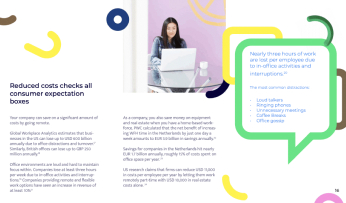Charming people can easily navigate the labyrinths of workplace politics, but being a smooth talker is just the tip of the iceberg.
You need complex and specific social skills such as emotional intelligence, good communication, and conflict management to influence and impress people.
Good interpersonal skills can help you live a richer and more fulfilling life, and they’re even more critical in the workplace.
But how do you begin developing them?
Social skills at work
Your ability to empathise, focus, speak well, and resolve conflicts will determine how far you go in any business.
These skills can—and will—dramatically impact your corporate growth. Employers everywhere value good communication, high emotional intelligence, and diplomatic skills.
Besides conversational ability, employers also consider your underlying body language, non-verbal cues, and interaction style when making hiring decisions.
Think of your interpersonal skills as a professional pattern that reflects your intent, understanding, and self-expression at work.
Develop social skills with customer service
As a service agent, you represent a corporation’s public views and interests, not your own.
You’ll regularly interact with a culturally diverse remote team and serve customers from different backgrounds and personalities, a job requiring specialised interpersonal skills.
An even faster way of developing your social skills is managing upset customers. These customers have an extra sensitive radar and know right away if you aren’t taking them seriously.
Your tone and intent will be clear, even in text-based communications. So it’s essential to work with them using your learned social skills.
The key social skills in customer service
We all need harmony, fulfilment, and happiness in our lives to feel good, including customers. People like to feel they’re being cared for by companies they trust.
To properly support your customers:
1. Communicate
Communicating with a customer has nothing to do with spoken language abilities. It’s a complex set of communication skills, including:
- Confidence when speaking
- Assertiveness without rudeness
- Awareness of verbal and non-verbal cues
⭐ Tip: Adjust your speech to sound even-tempered when talking with customers, even the angry ones. Avoid speaking too loudly, quickly, slowly, or softly, and stay good-humoured throughout.
2. Listen
Active listening in a professional setting is centring your focus on the conversation at hand. In doing this, you’re:
- Training your mind to pay attention
- Improving your ability to focus
- Engaging with the information you receive
- Thinking critically to find the correct solution
⭐ Tip: Make a bullet list of everything customers say and repeat the points when suggesting solutions; this reassures them that you’ve acknowledged and handled the issue.
3. Empathise
Many confuse empathy with sympathy, but there’s no point telling a customer how sorry you are when you don’t feel their pain. Empathy is:
- Understanding people’s discomfort
- Wanting to do something about it
⭐ Tip: Try to see things from others’ points of view. Accepting that other people are entitled to their unique worldview helps you develop respect and tolerance of opinions besides your own.
4. Resolve conflicts
CPP reports that 85% of employees across Europe and America deal with conflict in the workplace. However, lacking experience in managing conflicts can have a detrimental impact on your
- Wellbeing
- Productivity
- Growth
Working with customers trains you to compromise, be diplomatic, and negotiate, which conflict management is all about.
⭐ Tip: Stay calm and composed during stressful interactions by de-escalating the situation and addressing it with a problem-solving attitude.
How customer service sharpens your social skills
As a customer service rep, you’re on the frontline, engaging with customers directly and with no opportunity to lie low. Consequently, you’ll learn about:
- Taking ownership of issues by asking the right questions
- Controlling challenging situations by focusing on positive solutions
- Confidently asserting your expertise
- Being professional and composed at all times
- Improving your skills by observing your colleagues’ methods
Use your social skills to land other prospective jobs
Professional social skills are invaluable for proving your competence and landing future jobs. You can:
✅ Mention your skills in your cover letter, which should be clear, concise, and to the point. You can be more expansive in your resume.
✅ Highlight them in your resume by describing scenarios in which they helped advance your project, team, or company’s success.
✔️ Specify examples outlining your empathy, conflict resolution, and active listening and communication skills.
✅ Use them in a job interview and impress your interviewer by asking strategic questions to show your interest and active listening skills.
✔️ Stay calm and composed, and maintain eye contact if you can.
Use the confidence you’ve gained from your experience in customer service, and it’ll help you wherever you go.
Get the skills you need with Cocoroco
At Cocoroco, we want to help you grow. With a remote customer support job, you can develop vital career skills while earning from home.
Working in remote customer service lets you build your career and reap the benefits of:
- A concrete employment contract
- The comfort of your workplace
- Savings on travel and assorted costs
- The chance to develop essential career skills
Register now to find a remote support job that suits you.





